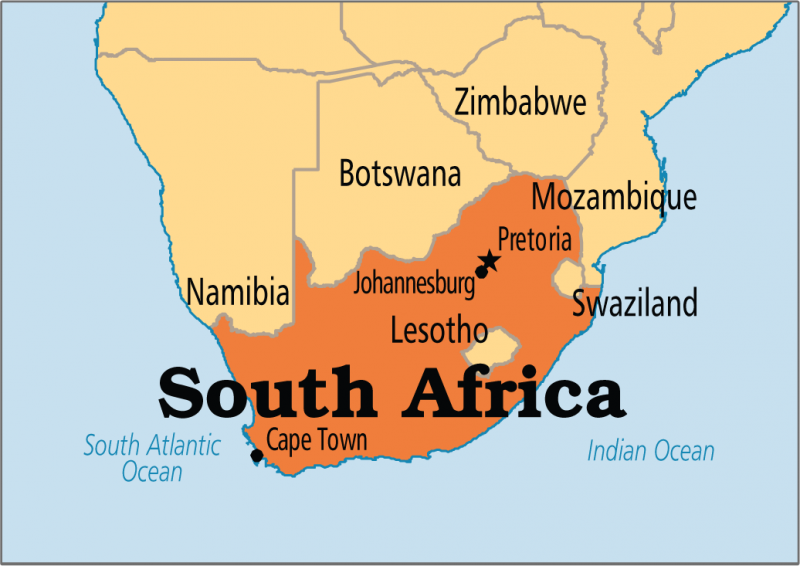International Relations
Violence in South Africa
- 16 Jul 2021
- 7 min read
Why in News
Recently, Riots and looting in South Africa have left more than 70 people dead, hurt thousands of businesses and damaged major infrastructure.
- It is the worst civil unrest since the end of white minority rule in 1994.
Key Points
- Reason for Recent Violence:
- Protests began over calls for release of former president Jacob Zuma, who served the country from 2009-18 and is facing corruption charges.
- Former Cabinet ministers, high-ranking government officials and executives of state-owned enterprises have implicated Jacob Zuma in corruption.
- Many feel that his successor as president, Cyril Ramaphosa, has failed to provide decisive leadership - either to calm anger over Zuma's imprisonment or to reassure South Africans that they will be safe.
- While the violence may have been spurred on by the imprisonment of Jacob Zuma, it’s being fanned by underlying problems in the country amid a raging pandemic and failing economy.
- In 2020, the country had witnessed its sharpest decline in annual Gross Domestic Product since 1946.
- Unemployment stood at a record high of 32.6% in the first three months of 2021.
- Protests began over calls for release of former president Jacob Zuma, who served the country from 2009-18 and is facing corruption charges.
- Government's Response:
- The government has condemned the violence and has stated that there is no justification for the violence. A lot of criminals or opportunistic individuals are trying to enrich themselves during this period.
- It has deployed its army to support the South African police, however, the rioting and looting haven’t stopped.
India- South Africa Relations
- Background:
- India’s links with the struggle for freedom and justice in South Africa date back to the period during which Mahatma Gandhi started his Satyagraha movement in South Africa over a century ago.
- India was at the forefront of the international community in its support to the anti-apartheid movement; it was the first country to sever trade relations with the apartheid Government (in 1946) and subsequently imposed a complete -- diplomatic, commercial, cultural and sports -embargo on South Africa.
- After a gap of four decades, India re-established trade and business ties in 1993, after South Africa ended its institutionalised racial segregation (apartheid).
- In November 1993, diplomatic and consular relations were restored.
- Political Relations:
- After South Africa achieved democracy in 1994, it was the Red Fort Declaration on Strategic Partnership between India and South Africa, signed in March 1997 which set the parameters for a rekindled relationship.
- The Strategic Partnership between the two countries was again reaffirmed in the Tshwane Declaration (October 2006).
- Both these declarations have been instrumental mechanisms that have contributed in the past to both South Africa and India for achieving their respective national objectives.
- India and South Africa have a long history of working together by coordinating their views and efforts in institutions of global governance/multilateral fora, in order to achieve greater autonomy and ensure that the agenda of ‘South’ is prioritised.
- For Example: BRICS (Brazil, Russia, India, China and South Africa), IBSA (India, Brazil, and South Africa), G20 , Indian Ocean Rim Association (IORA) and World Trade Organisation (WTO).
- Economic:
- India is South Africa’s fifth-largest export destination, and fourth-largest import origin and is the second-largest trading partner in Asia.
- Both countries are working to boost trade volumes in the coming years. Bilateral trade between India and South Africa currently stands at USD 10 billion.
- In 2016 both the countries agreed to collaborate in the defence sector, especially in terms of the opportunities available for South African private sector under ‘Make in India’ initiative, energy sector, agro-processing, human resource development, and infrastructure development.
- India is South Africa’s fifth-largest export destination, and fourth-largest import origin and is the second-largest trading partner in Asia.
- Science & Technology:
- The Department of Science and Technology of both countries have collaborated, especially in the Square Kilometer Array (SKA) project.
- Culture:
- With the help of the Indian Council for Cultural Relations (ICCR), an intensive programme of cultural exchanges is organised throughout South Africa including scholarships for South African nationals.
- The 9th World Hindi Conference was held in September 2012 at Johannesburg.
- Indian Community:
- The major part of the Indian origin community came to South Africa from 1860 onwards as farm labour to serve as field hands and mill operatives in the sugar and other agricultural plantations.
- South Africa is home to the highest number of Indian Diaspora in the African continent, with a total strength of 1,218,000 thereby constituting 3% of South Africa’s total population.
- Since 2003 onwards, India has celebrated Pravasi Bhartiya Divas (PBD) each year on 9th January (the day Mahatma Gandhi returned from South Africa to India).
Way Forward
- India-South Africa partnership is progressive and forward looking. Their rich culture and people-to-people contacts lends character and quality to India-South Africa ties.
- It is natural that South Africa needs other partners in Asia just as India is engaged in forging other partnerships in Africa. However, both India and South Africa will need to keep in mind constantly that their own bilateral relationship deserves priority and has immense potential that is yet to be realized.





